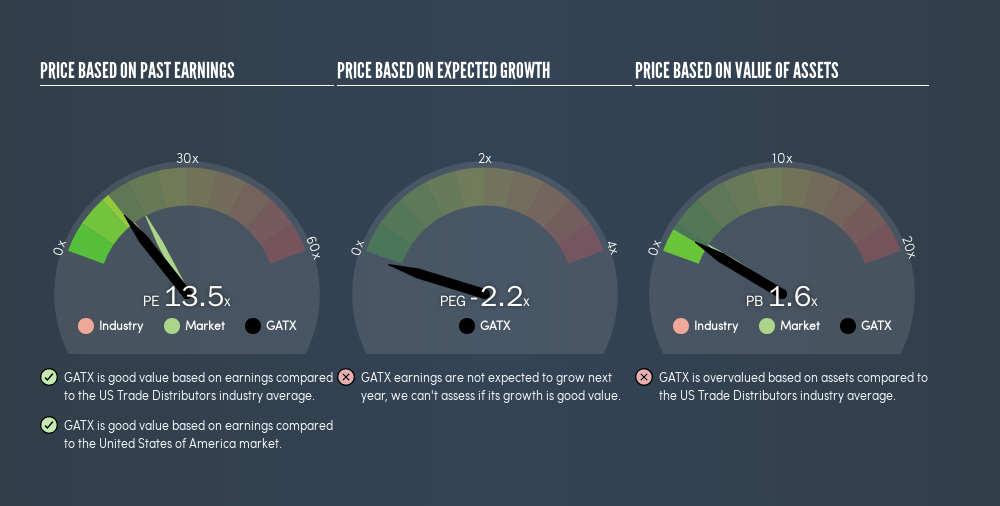- United States
- /
- Trade Distributors
- /
- NYSE:GATX
Read This Before You Buy GATX Corporation (NYSE:GATX) Because Of Its P/E Ratio

Today, we'll introduce the concept of the P/E ratio for those who are learning about investing. We'll apply a basic P/E ratio analysis to GATX Corporation's (NYSE:GATX), to help you decide if the stock is worth further research. Based on the last twelve months, GATX's P/E ratio is 13.51. That means that at current prices, buyers pay $13.51 for every $1 in trailing yearly profits.
See our latest analysis for GATX
How Do You Calculate A P/E Ratio?
The formula for price to earnings is:
Price to Earnings Ratio = Price per Share ÷ Earnings per Share (EPS)
Or for GATX:
P/E of 13.51 = $75.94 ÷ $5.62 (Based on the trailing twelve months to December 2018.)
Is A High Price-to-Earnings Ratio Good?
The higher the P/E ratio, the higher the price tag of a business, relative to its trailing earnings. That isn't necessarily good or bad, but a high P/E implies relatively high expectations of what a company can achieve in the future.
How Growth Rates Impact P/E Ratios
P/E ratios primarily reflect market expectations around earnings growth rates. Earnings growth means that in the future the 'E' will be higher. Therefore, even if you pay a high multiple of earnings now, that multiple will become lower in the future. So while a stock may look expensive based on past earnings, it could be cheap based on future earnings.
GATX's earnings per share fell by 57% in the last twelve months. But it has grown its earnings per share by 9.0% per year over the last five years.
Does GATX Have A Relatively High Or Low P/E For Its Industry?
The P/E ratio indicates whether the market has higher or lower expectations of a company. The image below shows that GATX has a P/E ratio that is roughly in line with the trade distributors industry average (13.9).

Its P/E ratio suggests that GATX shareholders think that in the future it will perform about the same as other companies in its industry classification. So if GATX actually outperforms its peers going forward, that should be a positive for the share price. Checking factors such as the tenure of the board and management could help you form your own view on if that will happen.
A Limitation: P/E Ratios Ignore Debt and Cash In The Bank
Don't forget that the P/E ratio considers market capitalization. In other words, it does not consider any debt or cash that the company may have on the balance sheet. The exact same company would hypothetically deserve a higher P/E ratio if it had a strong balance sheet, than if it had a weak one with lots of debt, because a cashed up company can spend on growth.
Such spending might be good or bad, overall, but the key point here is that you need to look at debt to understand the P/E ratio in context.
Is Debt Impacting GATX's P/E?
GATX has net debt worth a very significant 161% of its market capitalization. This level of debt justifies a relatively low P/E, so remain cognizant of the debt, if you're comparing it to other stocks.
The Verdict On GATX's P/E Ratio
GATX trades on a P/E ratio of 13.5, which is below the US market average of 17.9. The P/E reflects market pessimism that probably arises from the lack of recent EPS growth, paired with significant leverage.
Investors have an opportunity when market expectations about a stock are wrong. If the reality for a company is not as bad as the P/E ratio indicates, then the share price should increase as the market realizes this. So this freereport on the analyst consensus forecasts could help you make a master move on this stock.
Of course you might be able to find a better stock than GATX. So you may wish to see this freecollection of other companies that have grown earnings strongly.
We aim to bring you long-term focused research analysis driven by fundamental data. Note that our analysis may not factor in the latest price-sensitive company announcements or qualitative material.
If you spot an error that warrants correction, please contact the editor at editorial-team@simplywallst.com. This article by Simply Wall St is general in nature. It does not constitute a recommendation to buy or sell any stock, and does not take account of your objectives, or your financial situation. Simply Wall St has no position in the stocks mentioned. Thank you for reading.
About NYSE:GATX
GATX
Together its subsidiaries, operates as railcar leasing company in the United States, Canada, Mexico, Europe, and India.
Average dividend payer and fair value.
Similar Companies
Market Insights
Community Narratives



